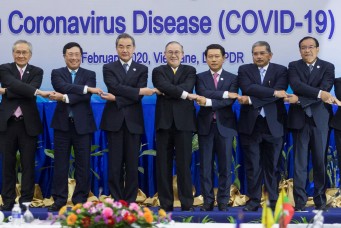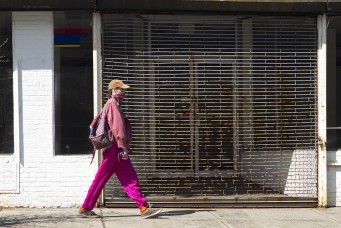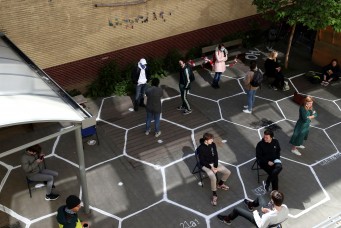Are We Seeing a COVID-Created New World Order Emerge?
The 2020 coronavirus pandemic has highlighted stark deficiencies in the post-World War II international system, and forces us to choose between the status quo and a new world order.

A cyclist rides by a graffiti reading “Together against Corona” in Berlin. April.29, 2020. EPA-EFE/Omer Messinger
It was the best of times, it was the worst of times. Emulating Dickens: “Crises bring out both the best and the worst in us,” Jan Eliasson, Chair of the Governing Board at the Stockholm International Peace Research Institute (SIPRI) and former Deputy Secretary-General of the United Nations (UN), said.
This was the theme of the webinar “Global Order Amidst Global Disorder” that was hosted jointly by the Tällberg Foundation and the School of Global Affairs and Public Policy (GAPP) at the American University in Cairo (AUC) on May 7. Throughout the 90-minute conversation moderator Ibrahim Awad, Professor of Practice in Global Affairs and Director of the Center for Migration and Refugee Studies at AUC, drew upon this divide between optimism and pessimism. His questions to the panel were dominated by one dilemma: will states view the pandemic as an opportunity to fill the gaps in the international system, or will the urge to return to “normalcy” translate into regression to a broken status quo?
For his part, Eliasson encouraged states to “build back better” after the coronavirus threat subsides—a motto he pulled from past experience with earthquake reconstruction. In the same way, “we have a chance to use this COVID crisis to try to create an order that is better than in the past,” he said optimistically.
To do this, we will have to assess our preparedness; interconnectedness; how we want different actors to cooperate; and what kind of institutions we need, he continued. “[The pandemic is] going to be a stress test both for Europe and the United Nations,” Eliasson noted, highlighting that waning U.S. support for the UN and the World Health Organization does not bode well for the future of international cooperation.
Alan Stoga, Chairman of the Tällberg Foundation and President of Zemi Communications, echoed Eliasson’s thoughts with one caveat: “If Jan is a worried optimist, I’m a hopeful pessimist,” he said. Stoga agreed that COVID-19 demonstrated that the international system is not sufficiently equipped to handle crises. He pointed out that the distribution of power, the nature and function of the global economy, and capabilities in technology are completely different than they were in 1945, when the UN was created. For him, reforming the international system is a matter of creating wholly new architecture.
Surveying Leadership
In this new architecture, Stoga is uncertain that the United States has the same leadership potential now that it had in 1945. He notes that, as the country considers “reopening”, the conversation is about opening barbershops, baseball stadiums, and local restaurants—not borders. “[Americans] are rediscovering our localism, not rediscovering our globalism,” he observed. “I think it’s fair to say that most Americans today see globalization as having excess costs with limited returns.”
At this point, Ghassan Salamé, former UN envoy for Libya and International Relations Professor Emeritus at Sciences Po, Paris, made an important distinction between globalization and international cooperation. “What I’m afraid of”, Salamé began, “is that the nationalists you just mentioned tend to confuse the two concepts together. They are, in fact, anti-globalists, and they end up saying that they want no international cooperation.”
On the topic of nationalism, Salamé cited a Guardian poll that found that 53 percent of young Europeans now believe that authoritarian governments are better equipped to stand up to crises (in the case of the poll, climate change) than democratic ones, which Salamé himself has his doubts about. “Are we ready to sacrifice our freedom for protection?” he asked. Yet, the distinction between democratic and authoritarian states is one that must be monitored as the pandemic is fought. Another related dynamic is the extent to which states allow public health to be dominated by economic concerns, as is the increased strength exhibited globally by local authorities over their federal counterparts.
The conversation around authoritarianism prompted Nabil Fahmy, Founding Dean of GAPP and former Egyptian foreign minister, to state that “we lost the social conscience of the world order”. Fahmy proposed a change in global political culture; though the UN was formed on the notion of collective action, our prioritization of power has prevented us from getting there. The COVID-19 crisis is a case study in the drawbacks of traditional thinking. Siloing the notion of “security” within the frame of the military has failed to insulate typically “strong” states from the effects of the virus; SIPRI reports that, of the $1917 billion spent globally on militaries in 2019, 38 percent of expenditures were accounted for by the United States, which has the most confirmed coronavirus cases in the world.
“How can nations talk about mutually assured destruction, but not have the healthcare systems to deal with these types of crises?…That’s really what’s missing,” Fahmy added.
At the core of the issue is a global culture of mistrust. “I grew up in a strong state”, Eliasson said, referring to his home state of Sweden, “but since the 1980s we have had a lot of deregulation and privatization. When you do that, you lose accountability, and that’s why we have so much distrust amongst nations.”
This mistrust has reduced global problem-solving capacity not only by biasing states towards arming themselves, but by creating an imbalance in the very institutions that have been created to bring them together. For example, UN Secretary-General Antonio Guterres has called for a global ceasefire; but, his word does not hold nearly as much weight on the ground as a resolution from the Security Council would, Eliasson said.
A New Bipolarity?
Seizing the conversation’s pivot to gridlock in the Security Council, Awad turned to Stoga to consider the relationship between its main sources of tension: that of the United States and China. Stoga began by refuting a popular framing of the rivalry: the Thucydides Trap, or the thesis that, when a state rises to challenge a hegemon, war is more likely than not. In Stoga’s conception, the relationship we should be considering is not one of China versus the United States, but of China versus the fabric of globalization.
“China was not part of the building of the international system; they were not at the table,” Stoga rebutted. Instead, they inherited a place in the system when they were given a spot on the Security Council in 1971, and were able to use existing networks of trade—and to a lesser extent, security—to their advantage. Yet, China is not fundamentally compatible with the framework that the Allies built, and seeks to renegotiate the rules of the game, said Stoga.
Salamé pointed out that the conversation between the panelists has emulated the West by considering 1945 as the beginning of the modern international order. But for China, it began as early as the colonial era. The legacy of colonialism—and its heirlooms, like international law and the UN conception of human rights—naturally oriented China away from the West.
The inefficiency of the Security Council poses a huge risk to the relevancy of the UN. “COVID-19 was a wakeup call,” Fahmy noted, because it forced the world to come to grips with the need for reform. “If you touch a live electric wire … if you don’t learn not to touch it again, you’re going to be in big trouble,” he aptly analogized.
But, the UN isn’t conducive to creative thinking, Fahmy conceded. He recommends thinking outside the box by starting outside of governments—with civil society, the private sector, regional organizations, and the scientific world, as Eliasson specified. With similar optimism, Eliasson hopes that such horizontal thinking will help incorporate nontraditional security threats into the UN agenda.
In considering a path forward, Salamé urged us to think inclusively, noting that globalization has had vastly different effects on different parts of the world. Inherently, globalization causes a weakening of the state; but, while this occurs to the benefit of the market in most advanced countries, the developing world often finds armed groups as the beneficiaries.
This view of solidarity above all underlined each participant’s closing remarks. “This is the first crisis—I’m now sixty-nine—where I know very little about the culprit,” Salamé said. “We have to rely on others to tell us that. This pushes us more towards humility, and in practical terms, more towards cooperation.”
“Either we work together, or we all suffer the consequences,” Fahmy agreed. “We are less powerful than we think.”
Sydney Wise is contributing editor at the Cairo Review of Global Affairs. Her past work has been published at the Boston Consortium for Arab Region Studies. On Twitter: @sydneyywisee
Read More



